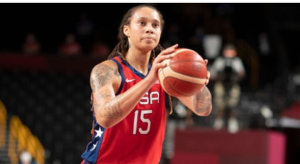CELEBRITY
Brittney Griner Explodes in Rage After Kid Rock’s Harsh Criticism: “If You Don’t Respect America, You Have No Right to Represent It” Full story in comment

WNBA star Brittney Griner is all over the news for all the unfortunate reasons. A Russian court recently sentenced her to 9 years in jail amidst talks between the officials of the two countries.

WNBA star Brittney Griner is all over the news for all the unfortunate reasons. A Russian court recently sentenced her to 9 years in jail amidst talks between the officials of the two countries.
Brittney Griner dropped her impassive game face, looked at me with big sad eyes and said, “The nightmare for me was definitely feeling like I was forgotten and that I was going to end up alone.”
I no longer saw a superstar. My heart ached for a young person who was an ocean away from everyone she knew. “Got here and I was all alone… I was just like ah, hell no, my life is coming to an end,” she said.
We cannot allow Brittney’s fear of being forgotten, alone and far from home come true.

It was 2014 and we sat in an empty conference room in Hangzhou, China. I’d flown 20 hours from Los Angeles to direct an ESPN documentary about her inaugural season overseas. Fresh out of college, she was drowning in homesickness. She didn’t speak the language and no one on her team spoke English. She didn’t like the food and survived off KFC, Pizza Hut and Skittles. And she spent her waking hours either on the hardwood or in her gray penthouse suite at the Zijingang International Hotel. Imagine all of the melancholy of Lost in Translation and none of the Bill Murray.
She was there for the money. As the No 1 pick in the 2013 WNBA draft, Brittney made $49,000 in her first season for the Phoenix Mercury against the $600,000 she earned with the Zhejiang Golden Bulls. If a women’s basketball player wants to make top dollar, she must go overseas. Half of the WNBA travels to countries like China, Russia, Turkey and France for much higher salaries, which raises the question whether their careers in the US count as their real off-season.
The verbal attacks have taken a toll on Griner’s mental and emotional well-being. In interviews, she has expressed feeling overwhelmed by the negativity directed at her. The constant scrutiny and personal attacks have made it increasingly difficult for her to focus on her career and personal life. Griner’s decision to leave the United States is a stark reminder of the intense pressure and scrutiny that public figures face, particularly those who choose to speak out on controversial issues.
The reactions to Griner’s departure have been mixed. Supporters commend her for standing by her principles and raising awareness about important social issues. They argue that her actions highlight the need for continued dialogue and reform in the United States. Critics, on the other hand, view her departure as a concession to the pressure and argue that she should have stayed to continue her fight on home soil.

WNBA star Brittney Griner is all over the news for all the unfortunate reasons. A Russian court recently sentenced her to 9 years in jail amidst talks between the officials of the two countries.
Brittney Griner dropped her impassive game face, looked at me with big sad eyes and said, “The nightmare for me was definitely feeling like I was forgotten and that I was going to end up alone.”
I no longer saw a superstar. My heart ached for a young person who was an ocean away from everyone she knew. “Got here and I was all alone… I was just like ah, hell no, my life is coming to an end,” she said.
We cannot allow Brittney’s fear of being forgotten, alone and far from home come true.
It was 2014 and we sat in an empty conference room in Hangzhou, China. I’d flown 20 hours from Los Angeles to direct an ESPN documentary about her inaugural season overseas. Fresh out of college, she was drowning in homesickness. She didn’t speak the language and no one on her team spoke English. She didn’t like the food and survived off KFC, Pizza Hut and Skittles. And she spent her waking hours either on the hardwood or in her gray penthouse suite at the Zijingang International Hotel. Imagine all of the melancholy of Lost in Translation and none of the Bill Murray.
She was there for the money. As the No 1 pick in the 2013 WNBA draft, Brittney made $49,000 in her first season for the Phoenix Mercury against the $600,000 she earned with the Zhejiang Golden Bulls. If a women’s basketball player wants to make top dollar, she must go overseas. Half of the WNBA travels to countries like China, Russia, Turkey and France for much higher salaries, which raises the question whether their careers in the US count as their real off-season.
The verbal attacks have taken a toll on Griner’s mental and emotional well-being. In interviews, she has expressed feeling overwhelmed by the negativity directed at her. The constant scrutiny and personal attacks have made it increasingly difficult for her to focus on her career and personal life. Griner’s decision to leave the United States is a stark reminder of the intense pressure and scrutiny that public figures face, particularly those who choose to speak out on controversial issues.
The reactions to Griner’s departure have been mixed. Supporters commend her for standing by her principles and raising awareness about important social issues. They argue that her actions highlight the need for continued dialogue and reform in the United States. Critics, on the other hand, view her departure as a concession to the pressure and argue that she should have stayed to continue her fight on home soil.
Griner’s decision to leave the United States also raises broader questions about the freedom of expression and the role of athletes in social and political activism. Athletes have long been influential figures in society, and their actions and statements often carry significant weight. Griner’s case illustrates the fine line that public figures must navigate between using their platform for advocacy and managing the personal repercussions of their activism.
In conclusion, Brittney Griner’s departure from the United States underscores the challenges faced by athletes who choose to engage in political and social activism. Her decision reflects the profound impact that public criticism and verbal attacks can have on an individual’s life. As the debate continues, it serves as a poignant reminder of the ongoing struggle for justice and equality, and the complex dynamics of patriotism and protest in modern America. Griner’s story will likely continue to inspire discussions on the role of athletes in advocating for social change and the importance of supporting those who use their platforms for the greater good.



